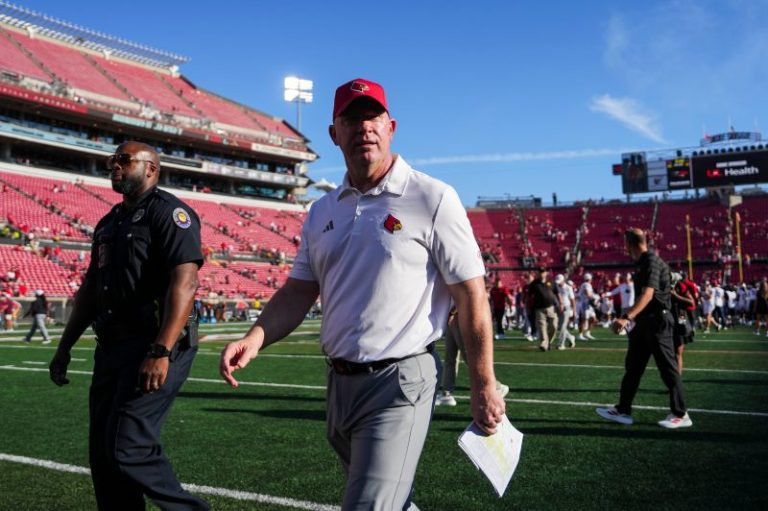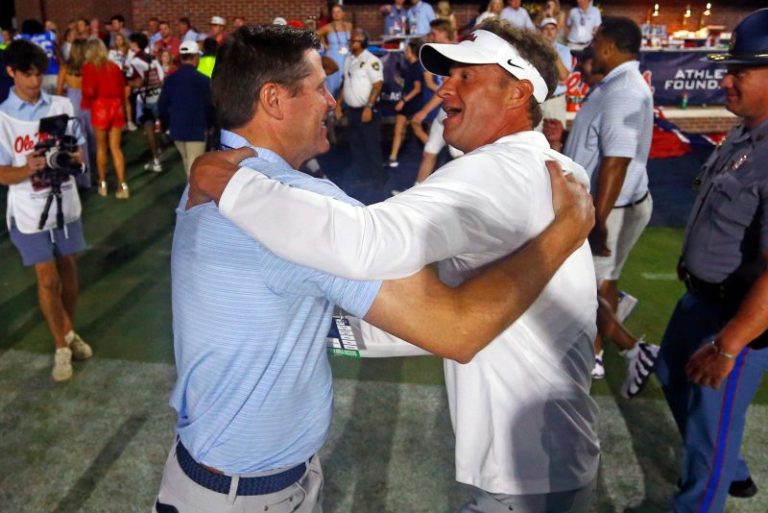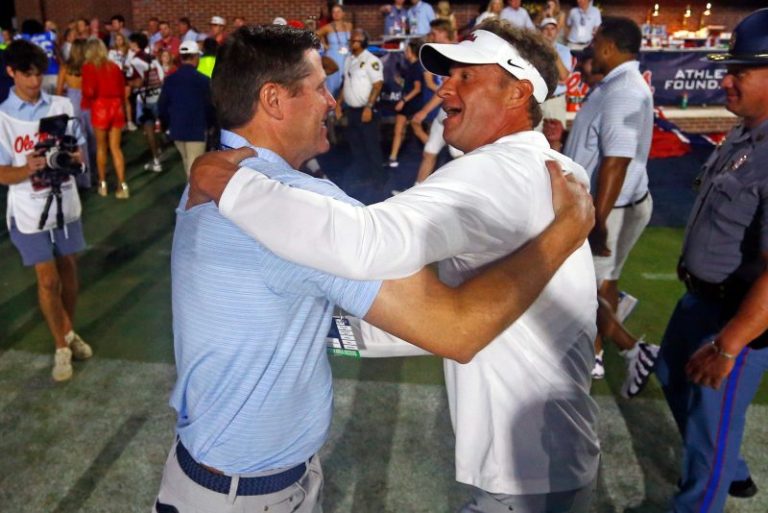Michigan could do worse than Louisville’s Jeff Brohm. Much, much worse.
Hire Biff Poggi? No.
Eli Drinkwitz and Kyle Whittingham not the worst ideas. Not the best, either.
Kalen DeBoer served up the Leonardo DiCaprio “Wolf of Wall Street” gif in Alabama’s first-round College Football Playoff win. Not literally. Tweeting isn’t DeBoer’s style.
But, consider Alabama’s 27 consecutive points in a 34-24 takedown of Oklahoma the DeBoer way of shouting: I’m not *bleeping* leaving.
Deal with it, Michigan.
Truly, though, how does Michigan deal with it? It needs a coach, and DeBoer and Arizona State’s Kenny Dillingham appear to be off the table.
In the best of times, Michigan would be one of college football’s hottest jobs. These aren’t the best of times for Michigan.
“It’s been five years of a malfunctioning organization,” interim coach Biff Poggi said. “Let’s call it what it is.”
Amen, Biff.
Michigan can’t break from the Moore chapter quickly enough. The transfer portal opening Jan. 2 heightens the urgency for the Wolverines to make a hire.
So, to whom should Michigan turn? Here are five ideas and an evaluation of each:
Idea 1: Make Jeff Brohm of Louisville say yes
Michigan wouldn’t need to sell me on a Jeff Brohm hire. The pitch writes itself. Jeff Brohm beat Urban Meyer. Google it.
That’s how you start the introductory press conference.
We know Brohm, 54, can thrive inside the Big Ten. He already has. He made Purdue not only competent but relevant. Ask Darrell Hazell, Ryan Walters or Barry Odom just how great a feat that is.
He’d be an adult in a room that needs one. He’d also be a proven quarterback developer within a program that needs one, whether Bryce Underwood stays or goes.
Brohm’s got enough moxie to welcome a challenge, plus a winner’s resume. He’s succeeded everywhere he’s coached. His current and former employers don’t have Michigan’s expectations. They also don’t have Michigan’s resources.
Brohm wouldn’t be a hire of humility or desperation. He’d be a strong choice in any circumstance.
Brohm enjoys a comfy situation coaching his alma mater in his hometown. But, if his goal is to win a national championship, then Michigan needs to make Brohm realize he cannot do that at Louisville, and he would enjoy everything necessary to chase titles at Michigan.
Grading this idea: 9/10.
Idea 2: Promote Eli Drinkwitz from Missouri to Michigan
Drinkwitz thrived the past three seasons with Kirby Moore calling Missouri’s offense. Washington State hired Moore as its coach earlier this month. How much of Drinkwitz’s success was a credit to Moore? Or, would Drinkwitz replicate that success with another coordinator? Michigan must ponder those questions.
Drinkwitz impressively won 21 combined games in the 2023 and 2024 seasons. Throughout Missouri history, only Gary Pinkel supplied a better two-year stretch.
Is Drinkwitz’s Missouri success the sign of a coach ready to step up to an elite job? Or, will Drinkwitz, 42, spend the rest of his career trying, but failing, to replicate his career crescendo?
These are difficult questions to answer with any degree with certainty, and so we’re left to guess.
Here’s my hunch: Drinkwitz is well suited to the job he has, and there’s no shame in that. If he’s hired by Michigan, he’d become another college football case study in the Peter Principle.
Grading this idea: 5/10.
Idea 3: Hire former Utah coach Kyle Whittingham
Whittingham, 66, says he didn’t retire, but rather stepped down after 21 seasons at Utah because he “didn’t want to be that guy that overstayed his welcome.”
In other words, he’s a free agent for hire.
Whittingham is only two years older than Indiana coach Curt Cignetti, so age isn’t a total dealbreaker. Anyway, if you get five good years out of a coach, that’s a success, nowadays. Older coaches can still thrive in this era. Does Michigan detect gas left in his tank?
Cignetti came to Indiana with something to prove. Does Whittingham feel motivated to prove himself, or would this be more of an outbound coach collecting one final paycheck?
Whittingham projects as a safe, transitional choice who’d keep the floor respectable at Michigan, while acknowledging the ceiling would stop short of the Big Ten’s top floor.
Whittingham last coached somewhere other than Utah in 1993, when he was Idaho State’s defensive coordinator. His place in Utah history is secure, but his bruised record against ranked opponents makes me question whether he’d achieve at the level Michigan craves.
Michigan could do worse. Could do better, too.
Grading this idea: 5/10.
Idea 4: Gamble on an up-and-coming coordinator
Here’s the way to approach this idea.
Step 1. Identify the hotshot young coordinator Michigan thinks might be ready for a coaching job.
Step 2. Hire him. Easy-peasy. He’s a coordinator. Why would he say no?
Step 3. Award a contract that’s nominally a five- or six-year deal, but with buyout terms that make it cost-tolerable to pull the plug if it’s clear after two or three seasons this won’t work.
Step 4. Hope you did, indeed, land the hotshot coordinator who’s the next big thing. If not, stroke the buyout check in Year 2 or Year 3, no hard feelings, and take another swing at this when the program is further removed from Moore’s stench.
It’s easy to brainstorm ways in which this idea would fail. If you want an example of this strategy working, see Oregon’s Dan Lanning.
The Ducks hired him from Georgia as the 35-year-old defensive coordinator off Kirby Smart’s staff. Lanning signed on to a six-year deal worth $29 million. The deal came with an affordable exit plan, if it didn’t work.
It worked, and Lanning is a rich man now. And Oregon has made the last two playoffs.
Apropos of nothing, Smart’s current defensive coordinator is 35-year-old Glenn Schumann.
Grading this idea: 6/10.
Idea 5: Biff Poggi, the job’s yours
Poggi has been serving as Michigan’s interim since Moore incinerated his career. Poggi says he’s interviewed for the coaching job and that he’s “being considered” for it.
He’s the continuity option. Is that really what Michigan should crave considering Poggi worked under Jim Harbaugh and Moore, both of whom landed Michigan in scandal.
Poggi, 65, is not to blame for Harbaugh’s actions or for Moore’s moral bankruptcy, but he’s neither an inspiring choice — Poggi went 6-16 coaching Charlotte — nor the sharp pivot Michigan should desire.
The next coach can decide whether he wants to retain Poggi in some capacity, but promoting Poggi to the head seat amounts to a white-flag waving.
Think of it this way: Would any other Power Four program consider hiring Poggi as its coach? I don’t have to tell you the answer to that question.
Grading this idea: 2/10.
Blake Toppmeyer is the USA TODAY Network’s senior national college football columnist. Email him at BToppmeyer@gannett.com and follow him on X @btoppmeyer.










